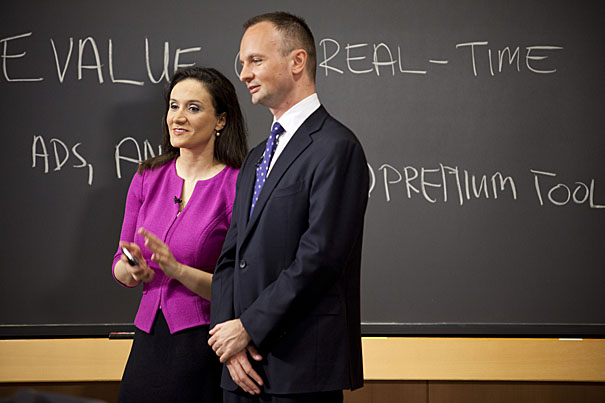
CNBC “Power Lunch” visits Harvard Business School to create several live segments on Twitter’s business plan with student and faculty experts in Hawes Hall. Michelle Caruso-Cabrera (left) reports the show and HBS associate professor Mikolaj Jan Piskorski provides expert advice.
Stephanie Mitchell/Harvard Staff Photographer
‘Power Lunch’ comes to HBS
CNBC show mines insights on Twitter’s future business model
When CNBC’s show “Power Lunch” wanted to gather predictions about Twitter’s future business model, the program’s hosts decided to ask a group of Harvard Business School (HBS) students who follow the economic side of social media.
To prepare for an on-air chat, several M.B.A. students from associate professor Mikolaj Jan Piskorski’s second-year elective “Competing with Social Networks,” which examines the ins and outs of online social platforms, held a brainstorming session where they discussed concepts such as billing for advertising or charging business users for premium tools and services.
To hear more about these strategies, “Power Lunch” anchor Michelle Caruso-Cabrera brought a TV crew to an HBS classroom on Monday (April 12) to conduct live interviews with Piskorski and several students. Caruso-Cabrera spoke first to Piskorski, who discussed the importance of social networks, and his course.
“‘Competing with Social Networks’ teaches students how to develop social strategies and use social platforms for profit,” he said. “It goes well beyond what has already been implemented and asks students to innovate and develop new solutions they can execute after they graduate.”
In the next segment, the students summarized their Twitter business plans in a way familiar to every Twitter user — in up to 140 characters. They suggested the company “capture the value of real-time data through ads, analytics, and premium tools. ”
Second-year students Adam Ludwin, Debbie Rosenbaum, and Oliver Bladek then weighed in on the pros and cons of each potential Twitter revenue model.
“Advertising is a proven business model on the Web, and Twitter is in the unique position of being able to integrate ads into real-time conversations,” Ludwin told the CNBC anchor. “The big question is how much this is worth, and whether what someone has posted on Twitter in real time is worth more than what authoritative sources say, which is why Google’s search results are valuable to advertisers.”
Whether students are going into technology-based careers or not, Ludwin said, social media make up a marketing channel that is growing rapidly and is here to stay. “Business leaders can’t afford to ignore Twitter and the wave of user-generated content that now so clearly influences the direction of products and services.”





